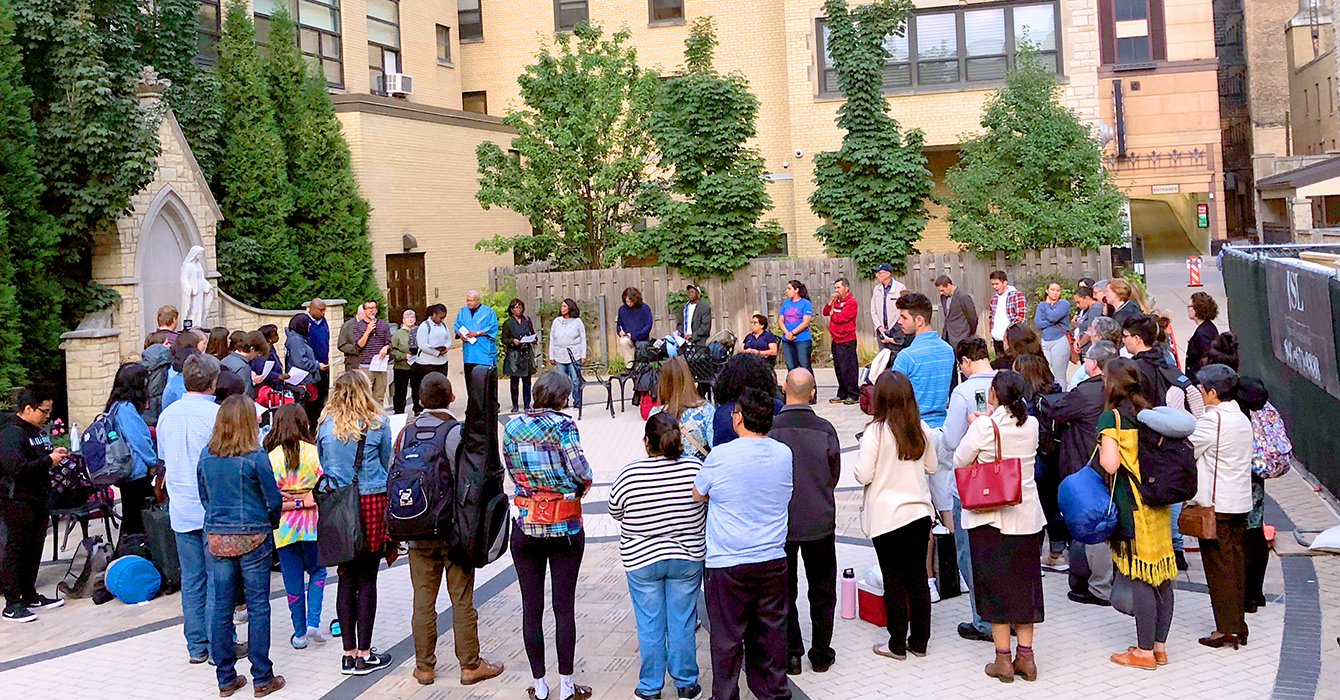It’s not an easy transition when five parishes, with over 600 years of history among them, become one. But in July 2021, following a trend of parish closures in Chicago, Our Lady of Africa opened as the new iteration of five African American churches in the historically Black Bronzeville neighborhood.
Anthony Williams, a member of one of the original parishes, realized that the new church’s social justice committee could use some assistance through the transition process, so he tapped the Coalition for Spiritual & Public Leadership.
The Maywood, Illinois-based CSPL trains and develops faith leaders and their respective congregations and institutions to become social justice leaders grounded in the Catholic theological tradition.
On Martin Luther King Jr. Day, 25 or so of Our Lady of Africa’s social justice committee members and CSPL leaders met in one of the parish’s larger social hall rooms, furnished with an altar decorated with images of civil rights movement leaders alongside a large HEPA filter as the omicron wave of COVID-19 was finally beginning to wane in Illinois.
After an opening prayer, the group spoke of what King’s work meant to them, with elders reflecting on their own work with King or the Student Nonviolent Coordinating Committee.
From there, Michael Okińczyc-Cruz, CSPL executive director and co-founder, discussed how the civil rights movement relates to social justice matters in Jesus’ time.
Over sandwiches, congregants pondered, “What did Jesus do in response to the problems that were being faced by the empire? How do his actions parallel how we should respond to the social justice issues of our day?”
Strategically building a more just society with community partners is integral to CSPL’s work. It encompasses an array of community efforts, including violence prevention, vaccine outreach, a pilgrimage to and teach-in at the El Paso border in support of immigrant rights, free COVID testing, and support for workers’ rights. And importantly, training more leaders to be catalysts for change.
The organization’s mission is grounded in liberation theology and lessons from critical historical contexts of Jesus’ life, in addition to his religious teachings.
“Let’s start with the historical context of what his life was really like, not just what’s been told to us,” said Joanna Arellano-Gonzalez, the director of spiritual and theological formation at CSPL.
“Grounding it in that has been one of the most beautiful things to witness, in terms of people seeing their faith in a different way, in a way where it’s deeper, it’s more alive,” she said. “I think you can’t be Catholic and not engaged in justice.”
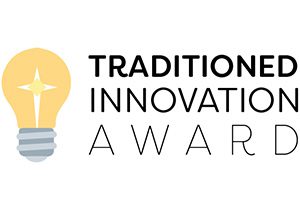
The Coalition for Spiritual & Public Leadership among 2021 winners
Leadership Education at Duke Divinity recognizes institutions that act creatively in the face of challenges while remaining faithful to their mission and convictions. Winners receive $10,000 to continue their work.
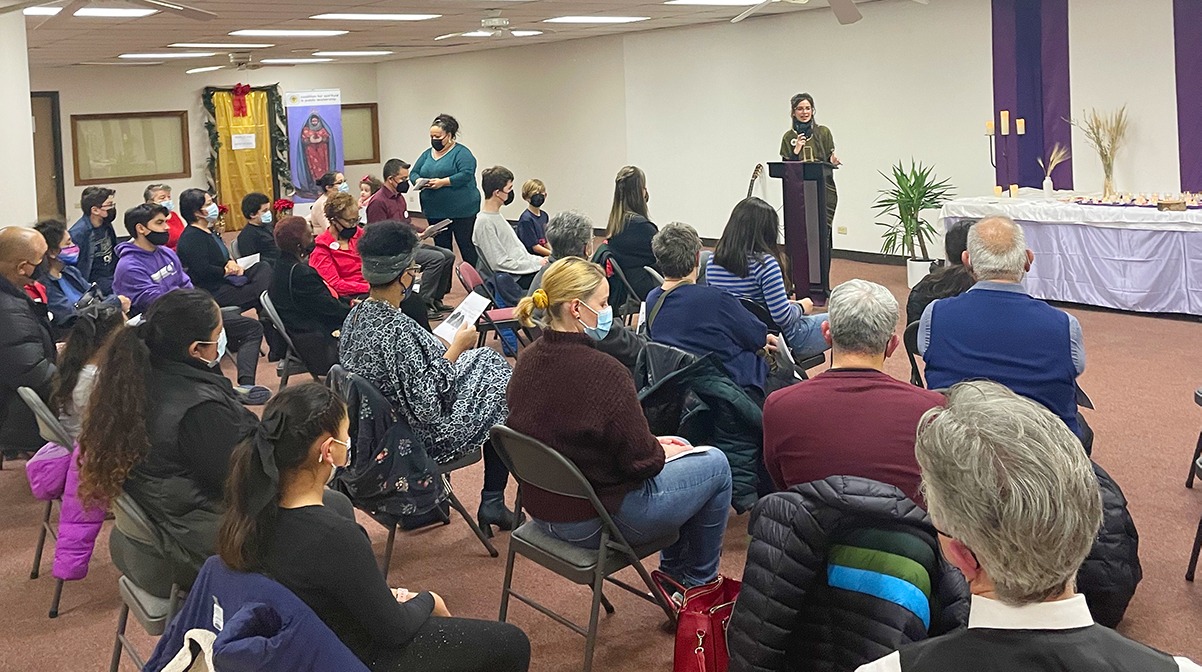
Grassroots grow deep
The coalition’s co-founders, Okińczyc-Cruz, Arellano-Gonzalez and Gabriel Lara, CSPL’s director of organizing training and economic justice, are the children of immigrants, refugees, union members, Chicago public school staff, non-English speakers, teachers — people who struggled financially and were rooted, above all, in Catholic faith.
Already experienced as organizers and faith leaders, the three founded CSPL in 2017 when they saw a need for an organization based firmly in both social justice and Catholic social teachings. It was important to fully integrate contemplation, discernment and the social teachings of the faith into an organizing campaign, Arellano-Gonzalez said.
“There’s a lot of work to do there in terms of bringing back this idea that faith has a lot to do with public life, the common good, the economy and the environment,” Okińczyc-Cruz said. “We fully lean into it.” Even so, he acknowledged, “it’s not easy work.”
The coalition is very deliberate about listening to the communities it serves before springing into action.
“When our work is at its best, there’s a robust commitment to listening, collective discernment,” Okińczyc-Cruz said.
What stands out for you from the discernment of this organization’s founders?
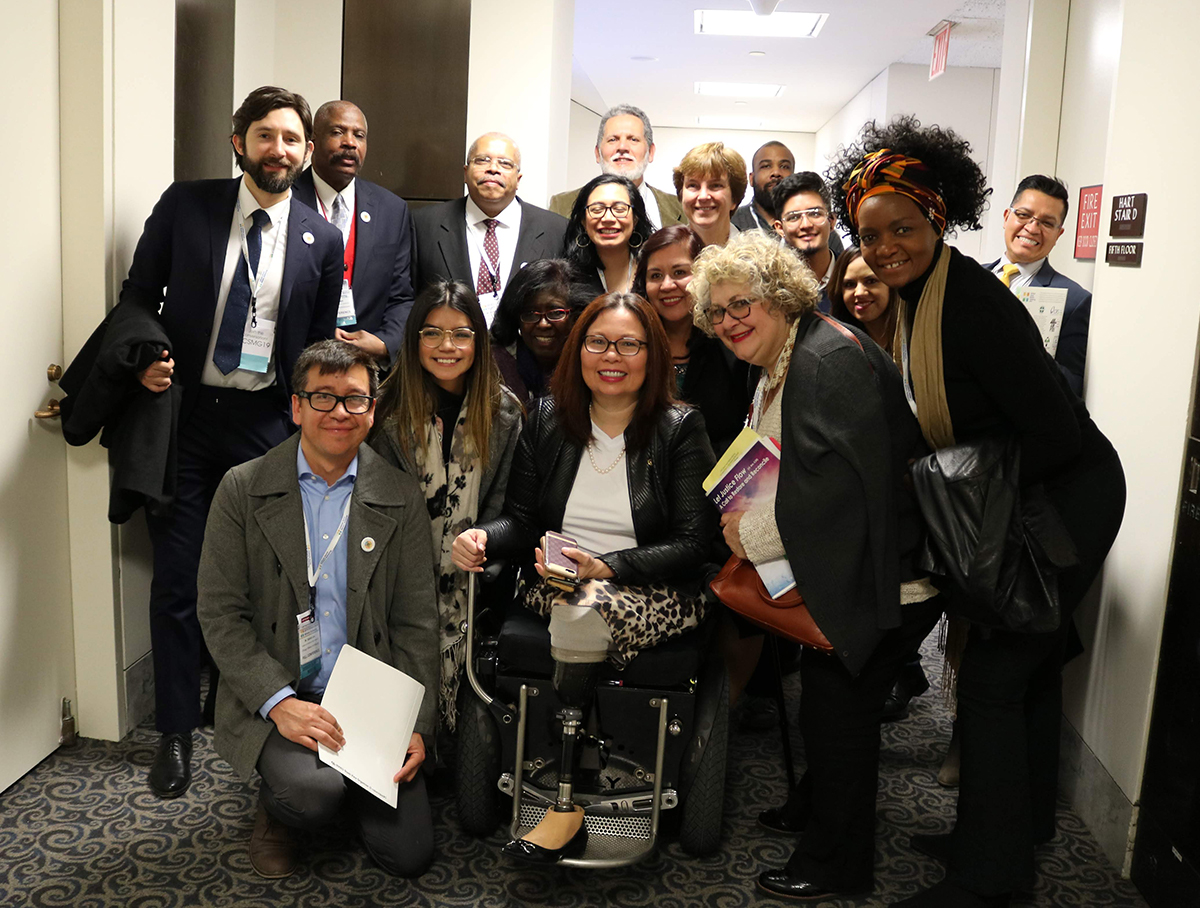
Williams, a CSPL board member, said the group faced some skepticism from longtime members of the parishes that made up Our Lady of Africa.
“It’s like, ‘What can I possibly learn from a training from this organization?’” he said.
So they began by listening. “First, we let people know, ‘We are not here to retrain you as far as your commitment. What we are here to do is to build up the various ministries of the parish,’” Williams said.
Prior to the MLK Day training, he met one-on-one with key leaders from former parishes so they could begin to establish ministries within the committee. Having built that foundation, he encouraged them to bring people along to the training session.
This daylong reflection and orientation laid the groundwork for the next few months of efforts to bring Our Lady of Africa’s social justice goals, whether focused on local food security or violence prevention, to life.
That collaborative work would include building a team, developing campaigns and actions, and connecting the team to other institutional member partners.
“It’s not just one parish on an island but one parish with 30-40 others on accomplishing larger, more ambitious campaigns,” Okińczyc-Cruz said. “If we’re working towards building the ‘beloved community,’ we gotta build power, and we do that through exercising that grassroots power.”
The listening process, typically scheduled as one-on-one or small group meetings between CSPL and community leaders, drives the engagement — and sometimes yields surprises.
In 2018, noting that CSPL’s local community of Proviso Township was home to an estimated 8,000 undocumented immigrants, CSPL’s team assumed that the main community concern was fear of Immigration and Customs Enforcement.
But the coalition hosted a large listening session and found that the community was worried, not about ICE, but rather about their children’s safety. The children of working-class families needed to be at school early so their parents could arrive on time for their 7 a.m. shifts.
The walk was dangerous, and unsupervised children were often caught up in fighting and bullying after they reached school grounds.
“When people would talk to the school district about it, their answer wasn’t so much, ‘What can we do?’ but, ‘Well, you’re not supposed to drop your kids off that early,’” said Sue Ross, CSPL’s vice president of finance.
After petitioning the school board and working with the local government and school district, CSPL helped establish Smart Routes to School, which placed adults trained in mental health and first aid along key pedestrian routes to help students walk safely to and from school and supervise them before school began.
“The parents were relieved. They felt like their children were safer,” Ross said. “The teachers and the administrators reported that the children were calmer and more ready to learn when they came into the classroom, because there wasn’t all of this tension and bullying, fighting, happening before school.”
When has listening made all the difference in your faith community?
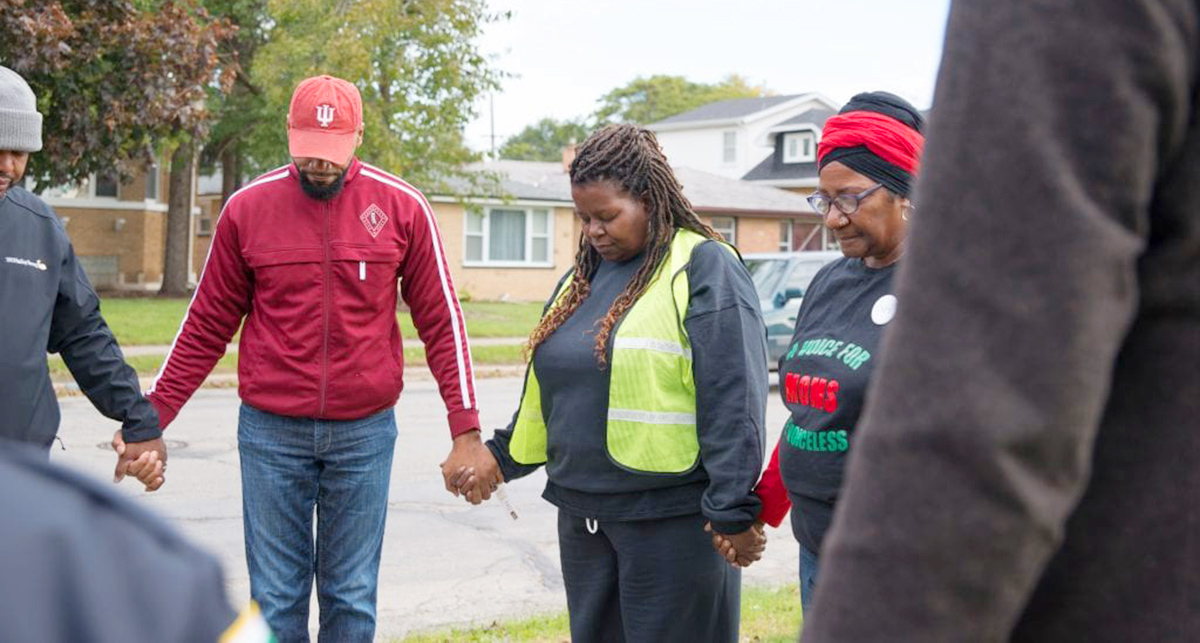
A beautiful tension
The coalition dives into the idea that concerns like children’s safety, workers’ rights and immigration rights go hand in hand with Christian faith.
“The implications of Jesus’ teachings had profound political ramifications within first-century Palestine under Roman occupation,” Okińczyc-Cruz said.
In addition to Catholic social teaching encyclicals, specifically the Pope’s “Fratelli Tutti” encyclical, Okińczyc-Cruz and his team study Paulo Freire and his idea of conscientization and developing critical thinking skills.
Okińczyc-Cruz points out that the church encourages followers to develop their consciences and that Pope Francis talks about politics being the place in which we work for the common good.
“The spiritual teachings of Jesus were interconnected to the political, economic, religious and cultural realities of his time,” Okińczyc-Cruz said. “We create this kind of firewall between our faith and public life, and that wasn’t the case for Jesus.”
Presenting organizing methodology alongside deep dives into Catholic social teaching, Ignatian contemplation, prayer and liberation theology, he said, offers a ripe opportunity for rethinking faith.
“We want people to wrestle critically with these ideas,” he said.
He mentions a workshop he taught in Spanish on workers’ rights and Catholic social teaching.
An attendee, a lifelong member of her parish, spoke up and said, “These are the things we’ve been taught to not discuss in church: the economy and politics. And here we are spending the last two hours saying this is what we need to be discussing,” he recalled.
“It was a very radical kind of reframing for her,” he said.
Do you see opportunities for similar innovation and reframing in your organization?
This critical reframing extends to other traditions as well. An adapted liturgical celebration of Las Posadas in Advent served to illustrate CSPL’s mission.
In the Latin American tradition, for nine days celebrants imitate Mary and Joseph’s journey to find a place to give birth, accompanied by Scripture, songs and a celebration on the ninth day.
CSPL hosted a Las Posadas event on the ninth floor of its office building, where nine closed doors represented systemic issues, including the economy, racial justice, gender justice, environmental justice and safety.
One of the 50 participants would knock on a door — for example, the one representing the economy, and ask, “Is there room for us?” Someone would open the door and say, “There is no room for you in the economy.”
The group would respond with statements like, “With the spirit of God, we will journey on to build the reign of God, so that everyone has a place in the economy. Where everyone has workers’ rights and a fair wage.”
This would continue until they reached the ninth door, which represented the reign of God.
The coalition is intentional about engaging with influential community partners, regardless of their spiritual affiliations, thanks to relationships with nonreligious organizations like Loyola Medicine and Proviso Partners for Health. Persons of other faiths also get involved, Okińczyc-Cruz said.
“For us, there’s always been this universal openness to people coming into our work, while at the same time honoring our roots and who we are. It’s recognizing that beautiful tension that has created such an environment at CSPL, where people do feel welcome to participate and engage,” he said.
How would your community describe the welcome of the final door into the reign of God?
They often welcome Catholics returning to the church after time away.
“For a lot of people, the faith that they were accustomed to growing up was taught to them in a very rigid way that feels exclusionary, especially if they are a young person of color or queer. We’ve had young people say, ‘I didn’t know this about my faith. I didn’t know this about Jesus. I didn’t know that this was part of what it means to be Christian.’”
Strength in numbers
More than two dozen organizations are institutional members of CSPL, carefully chosen partnerships leveraged to ensure that the coalition can continue to create a more just Chicago and church through grassroots campaigns to change racial, economic, social and environmental structures.
The organizers aim for CSPL to represent diversity in age as well as race, church involvement and financial background.
They choose to train organizations that can serve as catalysts in the community rather than operating as a training academy for paying customers. (The coalition’s primary sources of funding include membership dues, fundraisers and grants.)
Williams, who owns the Meal of the Day Cafe in Maywood, admires that CSPL incorporates local businesses into its organizing strategy. Cultivating relationships is key, he said.
“That’s what CSPL is all about. Cultivating relationships with institutions so that we have a stronger impact in various social justice issues. If you don’t build those relationships at the forefront, it’s kind of hard to motivate people to action,” he said.
How does the historical Jesus break into your own history with newness? Does it cause you to examine your own alignment and commitments?
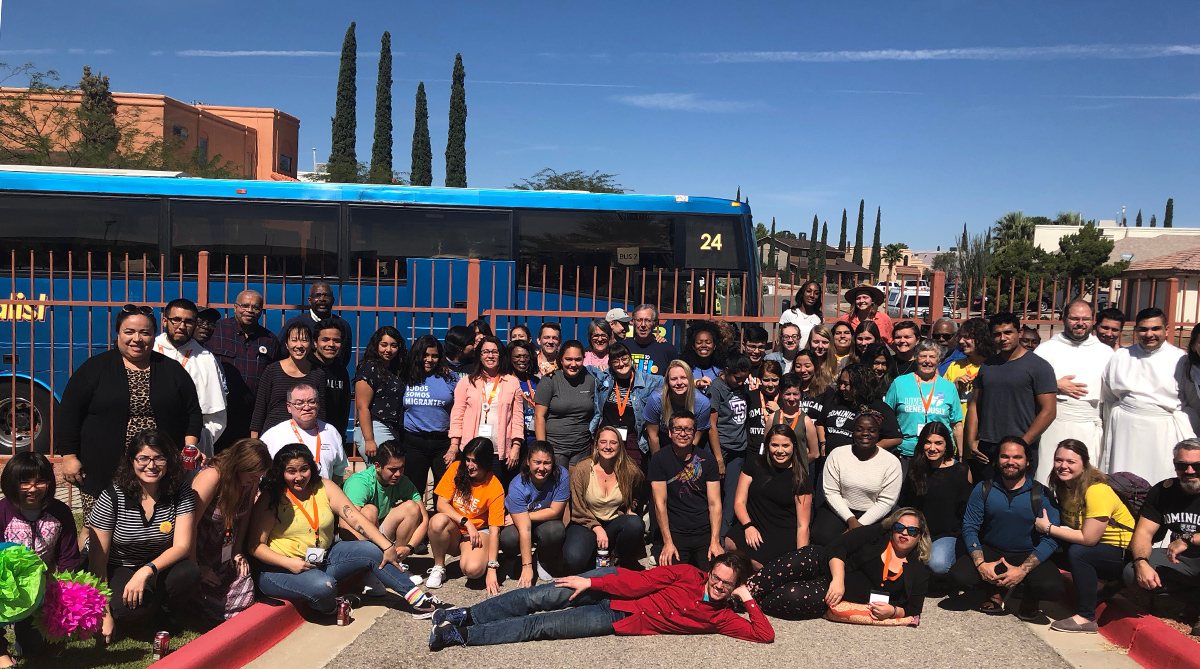
The group chose the word “coalition” purposefully when naming itself; the institutional members help set the agenda of CSPL.
“Our job is to help surface the leadership, the voice, the agency of the institutional and individual members that we work with,” Williams said. “It’s the people of God that are at the center of this work and whose agency, whose dreams, whose vision help establish the path ahead for all of us, collectively.
“I think that that runs so contrary to so much in society these days, where people just feel acted upon.”
The coalition comprises roughly 200 individual dues-paying members and 30 institutional members, which include congregations, university departments, religious orders, worker-owned cooperatives and more.
It currently employs four full-time staff, soon to expand to seven. With a 2022 budget of approximately $550,000, the group strives to ensure in the next several years that half of the operating budget is sustained through grassroots sources — membership dues, donations, etc. — Okińczyc-Cruz said.
Ross said that while the grants and rising membership numbers are metrics of CSPL’s growth, the group feels closest to its mission in less tangible ways, such as when hundreds of local residents took part in CSPL’s work to co-coordinate mental health first-aid training following a slew of student suicides in 2019 at the local high school.
And when CSPL members with children in prison or whose churches or businesses are closing down still put in the time to lead a committee or meet with a public official or show up for the Las Posadas Advent celebration.
The organization also has strategic goals, which include expansion into other Chicago suburbs and communities and a three-year plan to increase its capacity for training and formation and expand efforts in economic justice, violence prevention and immigration.
“Our culture is used to everything changing quickly,” Lara said. “Even in the Bible, Jesus called the fishermen and they follow him and they transform.” By contrast, CSPL sees members and trainees as partners on a long road.
“We support the whole journey,” Lara said. “We accompany these people and their transformation in building the kingdom. And it’s not a quick fix.”
Questions to consider
- What stands out for you from the discernment of this organization’s founders?
- Members of CSPL innovate on Catholic tradition to adapt their teaching to today’s context. Do you see opportunities for similar innovation and reframing in your organization?
- CSPL identified and named closed doors of injustice in the innovation on the Posada tradition. If your community were to adapt what CSPL did, what would you name the doors? How would your community describe the welcome of the final door into the reign of God?
- CSPL invites reflection and prayer with the historical Jesus in examining contemporary social reality and organizing to combat suffering and injustice. How does the historical Jesus break into your own history with newness? Does it cause you to examine your own alignment and commitments?
- In the listening campaign among immigrant community members, CSPL learned that the priority need was not what they expected. When has listening made all the difference in your faith community?

